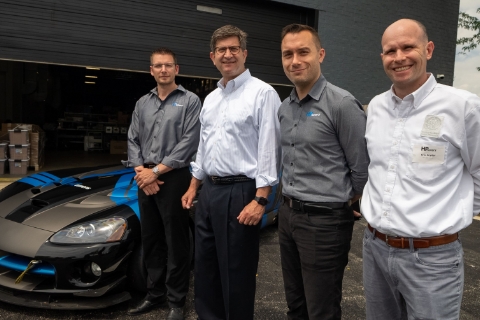SEMA News - February 2010
SEMA Publishes Guide on How Land-Use Laws Can Limit Off-Roading
 Being knowledgeable on issues that affect your customers is good business. On that topic, one of the biggest challenges impacting off-road enthusiasts is the closure of public lands to motorized recreation.
Being knowledgeable on issues that affect your customers is good business. On that topic, one of the biggest challenges impacting off-road enthusiasts is the closure of public lands to motorized recreation.
“There are still lots of roads, trails and dunes to traverse, but closure signs are being posted across the country, from North Carolina to California,” said Stuart Gosswein, SEMA’s senior director of federal government affairs. “That’s why we are alerting our member companies to the problem. As companies and consumers become aware of legislative and regulatory actions to restrict off-highway vehicle (OHV) access, they will be in a position to confront unnecessarily restrictive land-use policies.”
Land-use policies developed in Washington, D.C., and elsewhere have a dramatic impact on the availability of off-road trails. Because these laws and regulations are complex, SEMA has created a “Guide to Land-Use Policies & Off-Road Recreation” to help decode the Washington lingo.
The guide provides a broad overview of major laws that restrict access, such as the Wilderness and Endangered Species Acts as well as federal agencies that manage public lands and private organizations that support the hobby. It also includes SEMA position statements that act as guideposts for legislative and regulatory advocacy.
SEMA supports public land decisions that are reasonable and enjoy local community support. Land designated as wilderness would be an example of a decision that has critical consequences, since the designation automatically bans motorized vehicles.
“Wilderness legislation can have a direct impact on your customers,” explained Ethan Landesman, director of the SEMA Action Network. “Imagine a hobbyist installing a suspension kit, off-road lights or a brush guard to enjoy trails in Utah’s Great Basin, Grand Staircase-Escalante, Moab-La Sal Canyons or San Rafael Swell. Now imagine Congress passing a wilderness bill to close more than 9 million acres in Utah to OHV use. Where will your customers turn to go enjoy their hobby? The guide contains information that will help you protect this family-friendly activity.”
The danger to off-road hobbyists is not imaginary. Last Spring, Congress passed and President Obama signed into law the Omnibus Public Land Management Act, which designated more than 2 million acres of wilderness in nine states. It included areas in and around Joshua Tree National Park and the Eastern Sierras in California, Owyhee-Bruneau Canyonlands in Idaho, Mt. Hood in Oregon and Zion National Park in Utah.
In October, the U.S. Forest Service permanently closed the popular 29-mile Upper Tellico River OHV trail system in North Carolina, citing erosion concerns. SEMA and a number of OHV organizations and enthusiasts had urged the Forest Service to take a more measured response instead of simply closing the off-road recreation area.
Congress is now considering the Northern Rockies Ecosystem Protection Act. The bill would set a precedent by using the term “bioregion” as justification for converting 24 million acres in Idaho, Montana, Wyoming, Oregon and Washington into wilderness. SEMA has cautioned lawmakers that there are a myriad of bioregions across America, and it is too simplistic to create one massive ecosystem devoid of motorized activities.
While many bills and regulations are well-intended, they are also over-reaching in scope. For example, they do not “cherry-stem” existing roads and trails within the wilderness or create an alternative designation to allow some motorized recreation opportunities where appropriate. The initiatives don’t acknowledge that many hobbyist groups and clubs help clean and maintain trails on their own time and using their own dollars, thereby preserving the environment and ensuring that future generations can also enjoy the same natural splendor.
Understanding the issues and the players is the first step toward working on behalf of the millions of Americans who want responsible access to public lands or the accompanying economic benefits, whether for companies that market products or local communities that depend upon tourism. Advocacy may include contacting your elected representatives on specific legislation, passing along information to your friends and business partners, and networking with your customers, local car clubs and OHV organizations.







